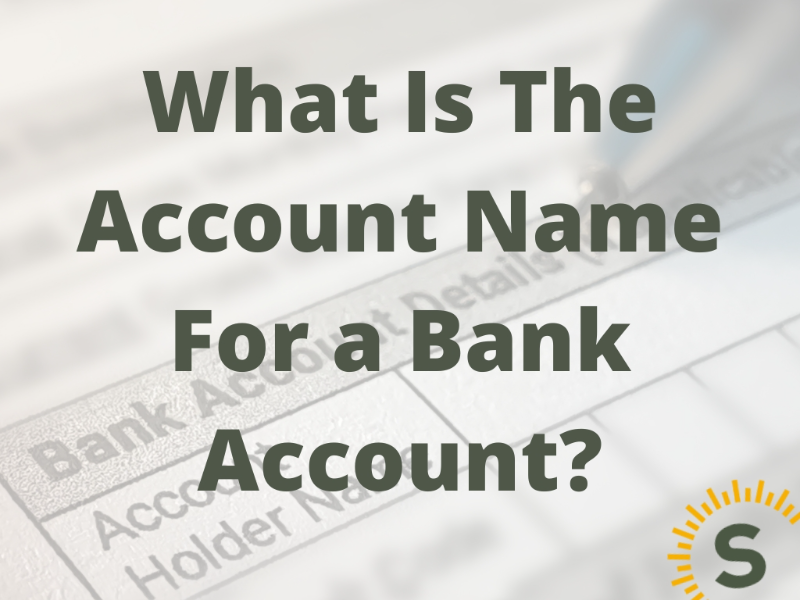
In the world of banking, the account name plays a crucial role in identifying and distinguishing bank accounts.
Whether you're opening a new account or managing an existing one, understanding the importance of an account name is vital.
So, what is an account name for a bank account?
In a bank account, the account name refers to the name of the account holder. Account names are typically formatted as "Firstname Lastname" for individuals and "Business Name" for businesses. For Joint accounts, it can be either name or both.
The account name is used to identify the account holder and ensure that transactions are processed accurately.
It is important to note that the account name is not the same as the account number or sort code, which are used for routing and identifying the specific account within the banking system.
The account name is an essential piece of information for both the account holder and the bank. For the account holder, it provides a sense of ownership and connection to their finances. It also helps in distinguishing between multiple accounts if the individual or business holds more than one.
For the bank, the account name serves as a means of verification and authentication. It ensures that transactions are authorised by the account holder and helps in preventing fraudulent activities.
In case of any discrepancies or issues with the account, the account name is used to investigate and resolve the matter efficiently.
★★★★★ 4.5
There are several types of bank accounts available in the UK, each designed to cater to different financial needs and requirements. The most common types of bank accounts include personal current accounts, savings accounts, joint accounts, and business accounts. Let's take a closer look at each of these account types and understand how the account name plays a role in their functioning.
A personal current account is a basic bank account that allows individuals to deposit and withdraw money as needed. It usually comes with a debit card and offers services such as online banking, direct debits, and standing orders.
The account name for a personal current account is typically the individual's full name, as it helps in identifying and differentiating between multiple account holders. This ensures that transactions are processed accurately and securely.
Savings accounts are designed for individuals who want to save money and earn interest on their deposits. These accounts often have specific requirements, such as a minimum balance or limited withdrawal options.
The account name for a savings account is generally the same as the individual's personal current account, as it is linked to their primary account.
This allows for easy transfer of funds between the two accounts and helps in tracking savings progress.
Joint accounts are bank accounts that are opened and operated by two or more individuals. They are commonly used by couples, family members, or business partners who want to share finances.
The account name for a joint account typically includes the names of all the account holders, separated by the word "and" or "&". This ensures that all parties have equal ownership and access to the account.
It is important to note that joint accounts require the consent and agreement of all account holders for any transactions or changes to be made.
Business accounts are specifically designed for businesses and organisations. They provide a range of services tailored to meet the financial needs of businesses, such as invoicing, payroll, and merchant services.
The account name for a business account is the legal name of the business or organisation. This ensures that transactions are authorised by the authorised representatives of the business and helps in maintaining accurate financial records.
A bank account name typically consists of the following components:
For example, if the individual's name is John Doe, the account name would be "John Doe". If the business name is XYZ Ltd, the account name would be "XYZ Ltd".
It is important to provide the correct account name while opening a bank account to ensure that transactions are processed accurately and without any delays.
Finding your account name is relatively simple. If you already have a bank account, you can refer to your account statements, checks, or online banking portal to find your account name. It is usually displayed prominently on these documents.
If you are opening a new bank account, the bank will ask you to provide your account name during the application process. It is important to provide accurate information to avoid any issues or delays in account setup. If you are unsure about your account name or have any questions, it is recommended to contact your bank directly for assistance.
Ensuring the correct account name is of utmost importance when it comes to banking. The account name serves as a unique identifier and helps in verifying the account holder's identity. It ensures that transactions are processed accurately and securely.
Providing an incorrect account name can lead to various issues, including failed transactions, delays in processing, and potential fraud. It is crucial to double-check the account name before initiating any financial transactions to avoid any unnecessary complications.
While entering account names, it is essential to pay attention to detail and avoid common mistakes that can lead to problems down the line. Here are some common mistakes to avoid when entering account names:
Yes, you can generally change your account name by contacting your bank and providing the necessary documentation. However, some banks may have specific policies or requirements for name changes.
No, you can have only one account name associated with a bank account. However, you can have multiple bank accounts with different account names if needed.
In most cases, your online banking account name will be the same as your account name used for other banking services. However, it is recommended to check with your bank for their specific requirements.
No, a personal bank account should be registered under an individual's name. If you own a business and want a separate account, you should open a business bank account under the business name.
If your account name is mis-spelled, it is essential to contact your bank immediately to have it corrected. Using a mis-spelled account name can lead to issues with transactions and identity verification.
Yes, if your account name is misspelled, you can typically request a correction by contacting your bank and providing the necessary documentation. It's important to rectify any errors promptly to avoid issues with transactions and identity verification.
No, each bank account can only have one associated account name. However, you can have multiple bank accounts with different names if needed to suit various financial purposes or entities.
No, personal bank accounts should be registered under an individual's name. If you own a business and require a separate account, it's advisable to open a designated business bank account under the business's legal name to maintain clarity and compliance with banking regulations.
The account name is an important aspect of a bank account in the UK. It serves as a unique identifier and helps in distinguishing between different accounts. Whether it's a personal current account, savings account, joint account, or business account, the account name plays a crucial role in ensuring accurate and secure transactions.
It is important to provide the correct account name and avoid common mistakes to prevent any issues or delays. By understanding the significance of account names and following the recommended guidelines, you can maintain a smooth and hassle-free banking experience.

Stuart is an expert in Property, Money, Banking & Finance, having worked in retail and investment banking for 10+ years before founding Sunny Avenue. Stuart has spent his career studying finance. He holds qualifications in financial studies, mortgage advice & practice, banking operations, dealing & financial markets, derivatives, securities & investments.





Our website offers information about financial products such as investing, savings, equity release, mortgages, and insurance. None of the information on Sunny Avenue constitutes personal advice. Sunny Avenue does not offer any of these services directly and we only act as a directory service to connect you to the experts. If you require further information to proceed you will need to request advice, for example from the financial advisers listed. If you decide to invest, read the important investment notes provided first, decide how to proceed on your own basis, and remember that investments can go up and down in value, so you could get back less than you put in.
Think carefully before securing debts against your home. A mortgage is a loan secured on your home, which you could lose if you do not keep up your mortgage payments. Check that any mortgage will meet your needs if you want to move or sell your home or you want your family to inherit it. If you are in any doubt, seek independent advice.